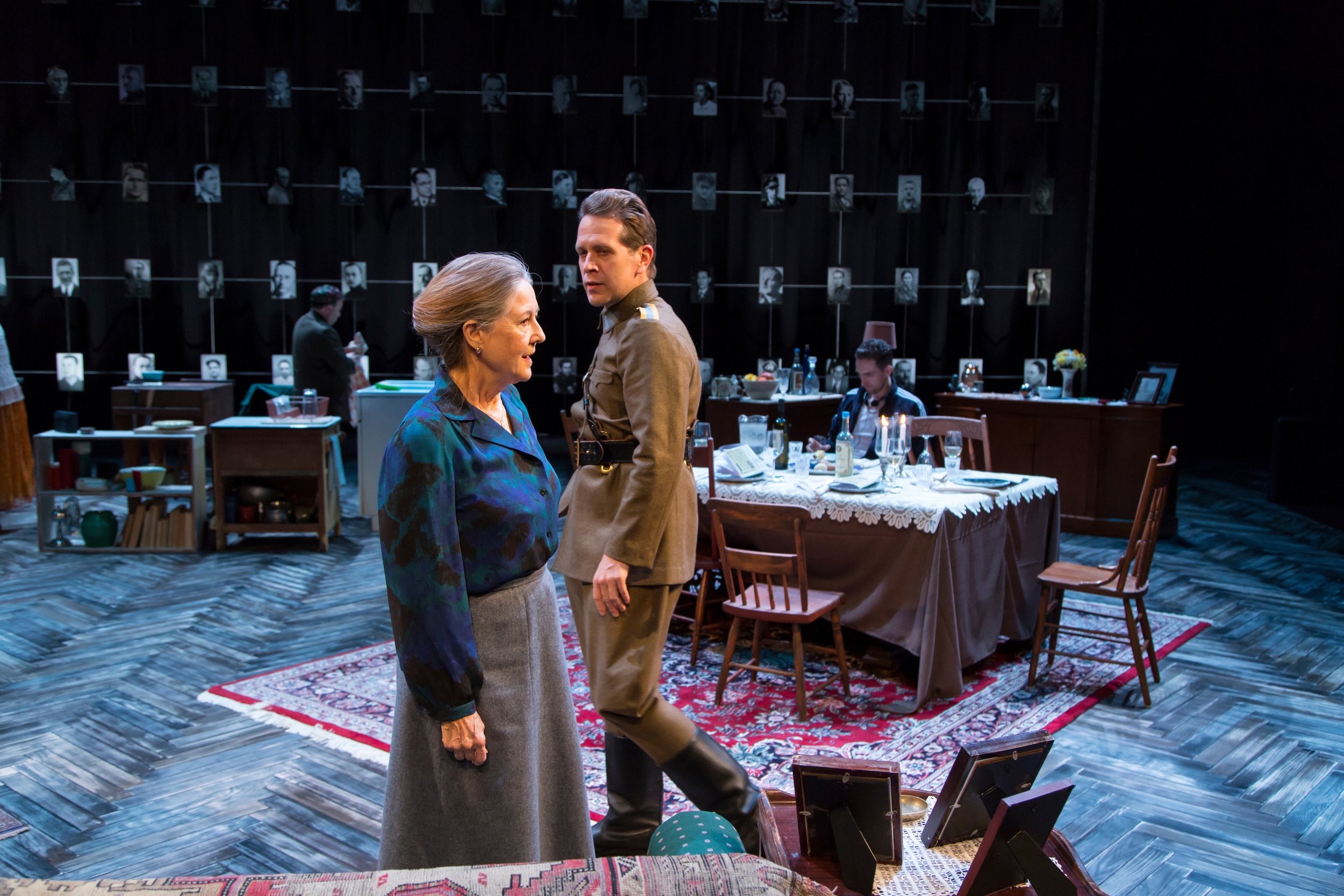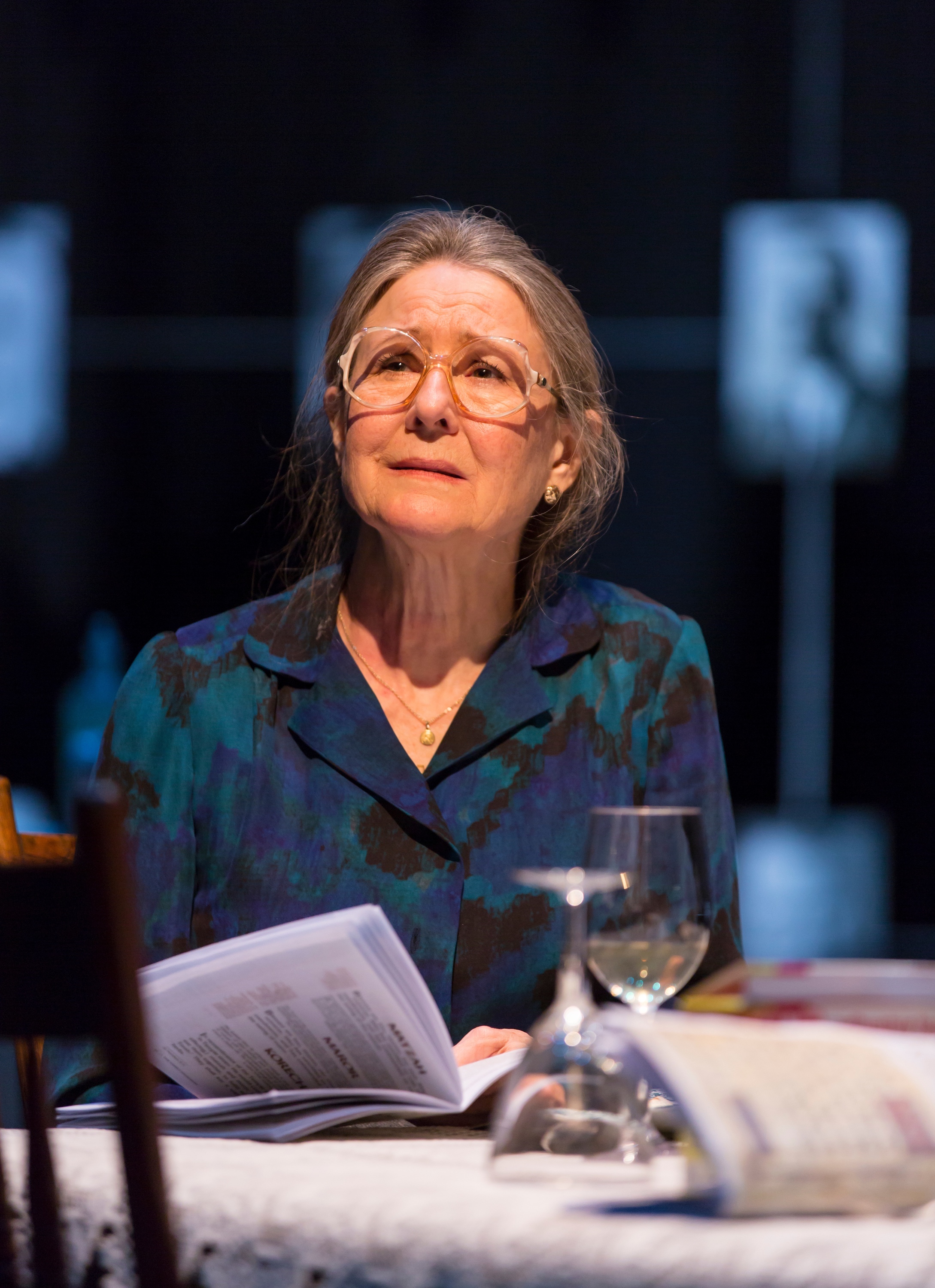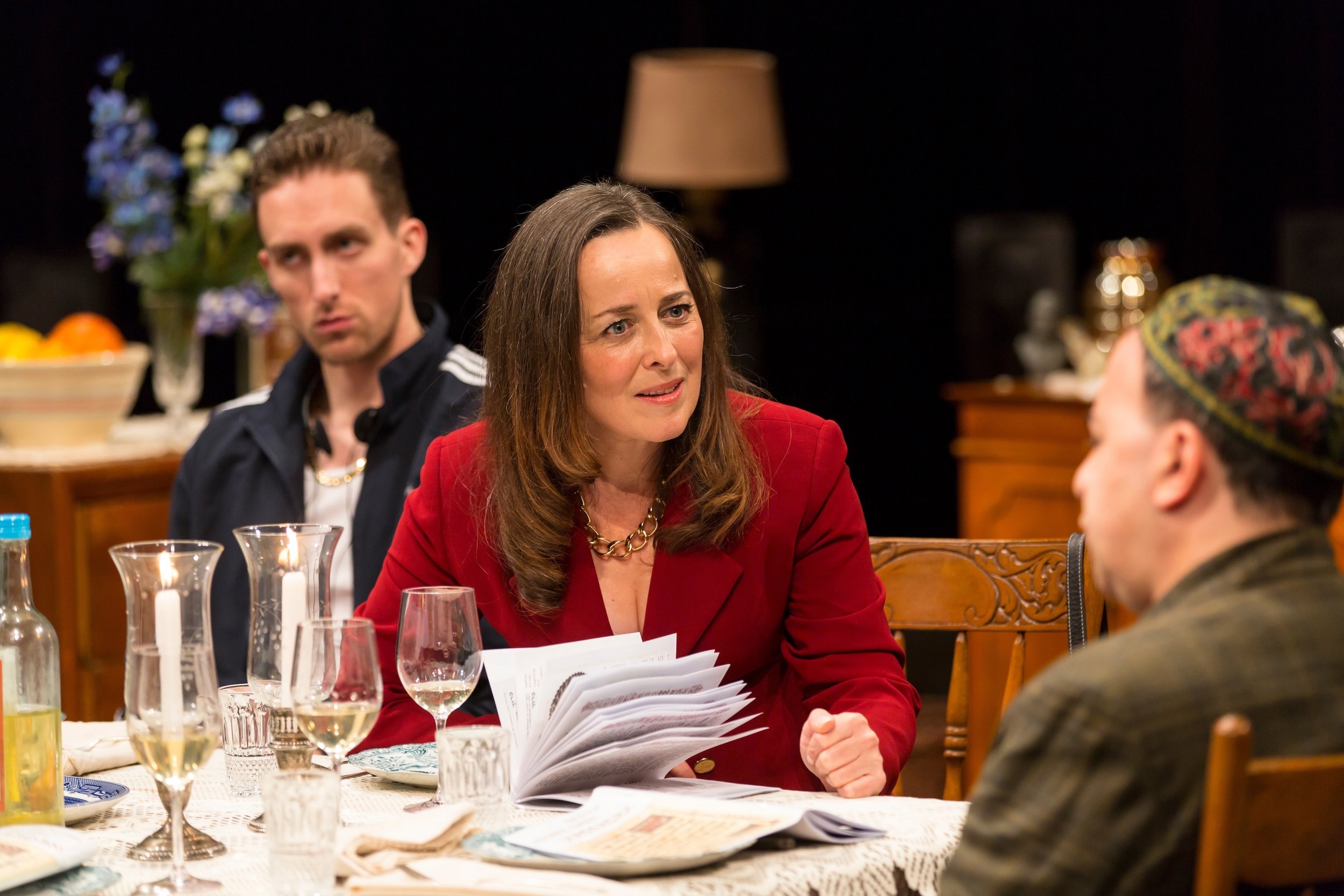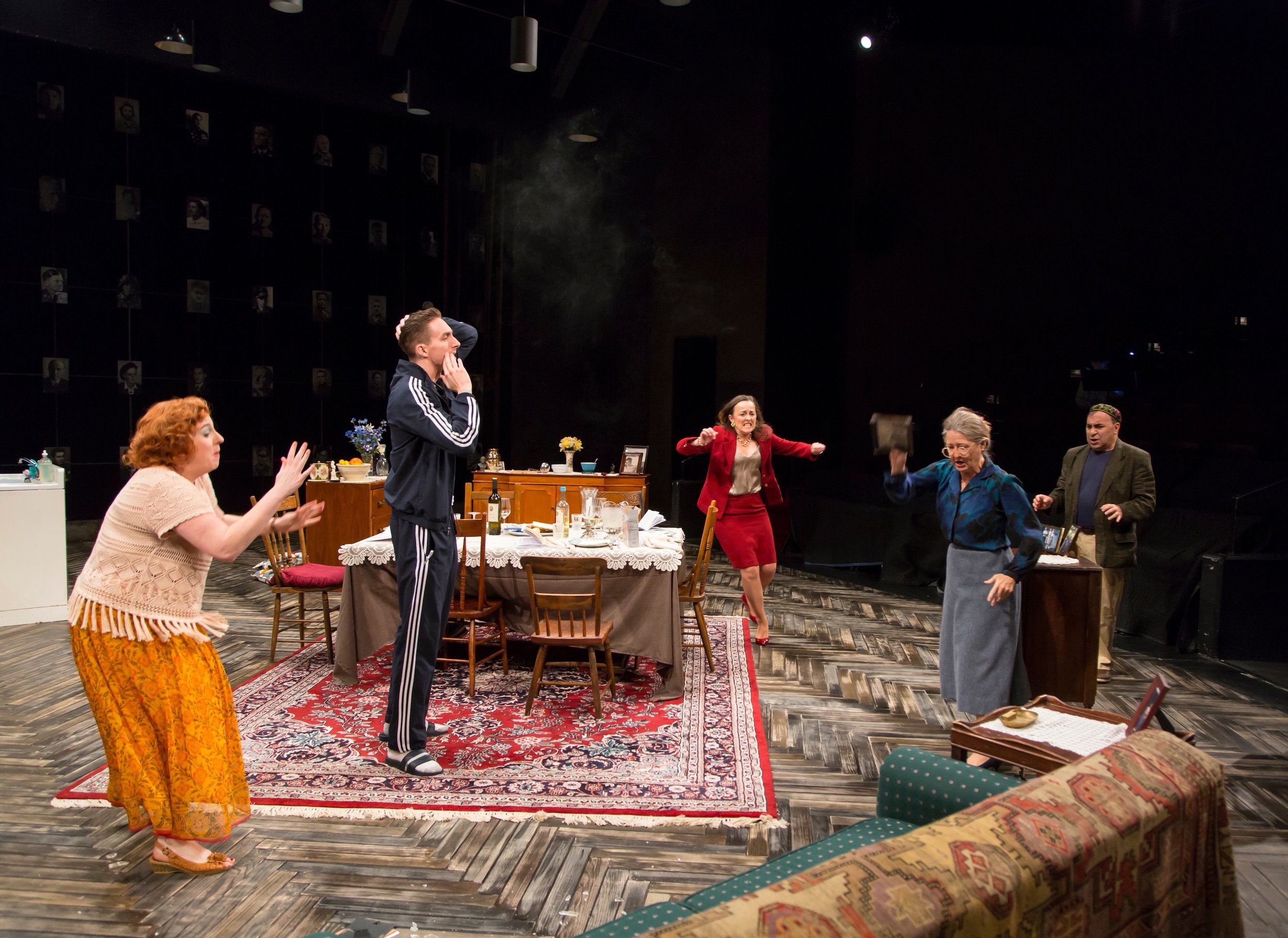Review of Seder, Hartford Stage
In 2002, the “House of Terror” museum opened in an infamous building at 60 Andrássy Street in Budapest, a public documentation of the tortures and murders that happened there, under the Nazis until 1944, and under the Hungarian Communist Party (HCP) until the end of the 1980s. In a world premiere at Hartford Stage directed by Elizabeth Williamson, Sarah Gancher’s Seder dramatizes the changes in Hungary through the medium of a particular family claiming its Jewish identity, suppressed under the Soviets, by celebrating Passover for the first time.
Margit (Julia Sirna-Frest), Erzsike (Mia Dillon), Laci (Dustin Ingram), Judit (Birgit Huppuch), David (Steven Rattazzi) (photos: T. Charles Erickson)
Such a ritual, we might imagine, would be a way of bringing the family together and healing whatever divides remain. That’s the intention of Margit (Julia Sirna-Frest), the sweet daughter in a bitter family, who invites her friend, David (Steven Rattazzi, in a subtly comic performance), to lead her, her cynical brother Laci (Dustin Ingram), their estranged sister Judit (Birgit Huppuch), and their mother Erzsike (Mia Dillon) in the meal, the prayers, the four cups of wine, and the symbolic meanings.
Erzsike (Mia Dillon), Attila (Jeremy Webb), foreground
As the matriarch wanting to find common ground with daughter Judit, Mia Dillon’s Erzsike commands an uneasy sympathy. The tense scenes in 2002 are coupled with flashbacks that show Erzsike as a young woman working as a secretary at 60 Andrássy. She is coerced into a sexual relationship with Attila (Jeremy Webb), one of the commanders in the HCP, who arranges her marriage with Tamás (Liam Craig), the man the children knew as their father. We need this background because one of the great divides in this family is that Judit is on the board at the House of Terror museum where her mother’s face is on “the Wall of Murderers” as one who served in the hated regime.
The play is set in a sprawling apartment with living room, dining room, kitchen, designed as open spaces with the baleful presence of the Wall of Murderers hovering visibly throughout the drama. The play opens with Erzsike coming face-to-face with her photo on the wall, and much of the play will be concerned with her coming to grips with her past. As Erzsike, Dillon turns in a finely calibrated performance. She’s anything but a sentimental woman, in 2002, and, in her youth, was the innocent she would like her family to see her as. Dillon plays both ages winningly—much as she did when playing a mature woman and an 8-year-old boy in Caryl Churchill’s Cloud 9 at Hartford Stage, also directed by Williamson, last season.
Erzsike (Mia Dillon)
What comes out in Gancher’s fraught, emotionally powerful and important play, is the toll on ordinary lives of extraordinarily unpleasant political realities. The drama explodes several times, yet maintains the believable rhythm of a domestic gathering where strong words are followed by efforts at reconciliation. The humor of the situation is largely maintained by David’s well-meaning focus on the matter at hand—the Seder—and by Laci’s deadpan comments. The main events feature an entertaining collection of voices and agendas, and each cast member contributes significantly to the 2002 scenes. In the past, Webb’s Attila brandishes power in intimacy to chilling effect, while Craig’s Tamás is a dutiful performance in an underwritten role. The scene when we see the parting between husband and wife—one of the grievances Judit lays on her mother—is one of the few where the play’s pacing suffers.
Laci (Dustin Ingram), Judit (Birgit Huppuch), David (Steven Rattazzi)
Key to the political situation is how those who seize power vilify those in power before them, a point that Erzsike has enough historical overview to see. At the heart of the human story is a vindictive battle for historical vindication that pits Judit against Erzsike, whose sins as mother and wife—in Judit’s view—share common cause with her generation’s political hypocrisy, enjoying the fall of Communism without having to own their complicity with its ruthless rule. There is much airing of grief, and Birgit Huppuch gives a thoroughly involving performance as Judit. Full of spite, anger, misery, and, finally, tears that feel fully earned, Judit works through righteous indignation and a daughter’s sense of betrayal to cathartic effect.
Probing, gripping, and touching, Seder provides a lively meal as the basis for a family drama and takes full dramatic advantage of the insight that the personal is political. Though such may not be so literally the case in most families, the question of allegiances and former complicity is very much an issue for many. The benefits and the blame of holding power go hand in hand in Sarah Gancher’s sharp play.
Margit (Julia Sirna-Frest), Laci (Dustin Ingram), Judit (Birgit Huppuch), Erzsike (Mia Dillon), David (Steven Rattazzi)
Seder
By Sarah Gancher
Directed by Elizabeth Williamson
Scenic Design: Nick Vaughan; Costume Design: Ilona Somogyi; Lighting Design: Marcus Dilliard; Sound Design: Jane Shaw; Script Consultant: Jocelyn Clarke; Fight Choreographer: Greg Webster; Casting: Laura Stanczyk, CSA; Production Stage Manager: Lori Ann Zepp; Assistant Stage Manager: Merrick A. B. Williams
Cast: Liam Craig, Mia Dillon, Birgit Huppuch, Dustin Ingram, Steven Rattazzi, Julia Sirna-Frest, Jeremy Webb
Hartford Stage
October 19-November 12, 2017




